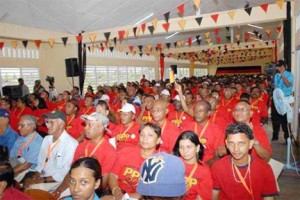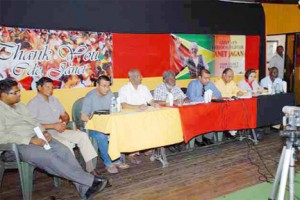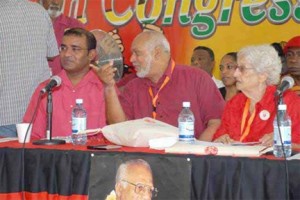With their hands in a three-fingered salute pointing at the ceiling and the stirring lyrics of the battle song “Oh Fighting Men” on their lips, delegates to the People’s Progressive Party’s triennial congresses renew the vows and reenact the rites of an anachronistic creed. Now that the Jagans are gone, will the PPP break with the political culture of their era?

The People’s Progressive Party over the last 59 years has been built on four pillars – the myth of Marxism-Leninism; the precept of democratic centralism; the saga of the struggle against colonialism and capitalism and the cult of the Jagans. These four articles of faith imparted a special sense of mission and rallied generations of supporters. Inscribed in sacred texts such as Forbidden Freedom and The West on Trial and sustained by shrines at the Babu John memorial and the Enmore martyrs’ La Penitence gravesite, the party has created a mystique which helped it to remain a strong force in local politics. But change has come.
Pillars
Cheddi and Janet Jagan employed the lexicon of Marxism-Leninism – meaningless to most living Guyanese – to articulate an overarching ideological dogma and to suppress apostasy. Adopting the label of ‘scientific socialism’ in the 1940s, and Marxism-Leninism in the 1970s, the party defeated every internal effort to expunge the expression from its constitution. The undemocratic notion of ‘Democratic Centralism’ − a Leninist precept that prescribes, “Freedom of discussion – Unity of action” − similarly, has been useful in containing ambitious aspirants and suppressing conflict. The idea is that, once decisions are adopted by the majority, members must support the party line.
As a component of the Leninist party system, democratic centralism complements the process of indirect election which, amazingly, has been capable of repeatedly returning largely unchallenged and unchanging lists of leaders to the PPP’s powerful Central and Executive Committees for decades. That mechanism can remove rebels and reward the compliant by avoiding direct elections. Instead, party members in their districts elect about 1,000 delegates to the triennial congress; they in turn elect the thirty–five members of the Central Committee; and they in turn elect the 15 members of the Executive Committee.
Central to the PPP belief system is that of struggle, sacrifice and victimhood. Accord-ing to the party’s legends, it fought − invariably alone − for independence against colonialism, for socialism against capitalism and for democracy against the authoritarianism of the People’s National Congress administration. Its history tells of the machinations of the UK and USA and the collaboration of the United Force and PNC parties with the trade unions.
The party also developed a mystical sense of mission derived from the tale that Cheddi and Janet Jagan landed in a backward colony to establish an enlightened party, the benighted inhabitants and ushered in an era of prosperity. The party had to struggle heroically against an array of adversaries and adversities – the UK’s suspension of the constitution in 1953; the schisms of the rightist ‘opportunists’ and the leftist ‘deviationists’ in 1955-56; the USA’s intrigues through the AFL-CIO and CIA; the British Guiana Trades Union Congress’s strikes; and the PNC’s rigged elections.
As a consequence of these beliefs, the party has been able to convince its supporters that its historical mission is to lead the country and no other party is qualified to do so. It thinks also that, useless as the concept of Marxism-Leninism might seem to many, it is the myth that still underpins the notion of international solidarity with other communist parties in China, Cuba, Korea, Russia and elsewhere. These, supposedly, were the beliefs and relationships that helped them to defeat their adversaries locally, in the sugar industry and abroad, in the international community during the Cold War and should not be cast aside in the new world order.
The personality cult, a popular practice in the old USSR, placed the Jagans at the heart of the party. Responding to apprehensions that the party could be harmed without a Jagan at the helm, Bharrat Jagdeo announced in early April “…this party will grow from strength to strength, guided by the ideals of these wonderful people, these extraordinary people.” Waxing metaphysical, he continued by claiming that “…the Jagans are not just personalities – they are ideals. They are principles and, therefore, although they are not there in living flesh they will continue to guide this party long into the future and we have to make sure that their legacy does not fall by the wayside.”
Janet Jagan’s ingenuity and industry helped to market her husband’s powerful charismatic appeal, especially among the voting rural masses who understood nothing about Marxism. Even after his death in March 1997, Janet Jagan ensured that Cheddi Jagan’s image remained vivid. His words were immortalised by the publication and reprinting of numerous books and his legacy preserved. She believed in her husband and transformed him into a cult figure with his name inscribed on the Cheddi Jagan International Airport, Cheddi Jagan Dental School and Cheddi Jagan Research Institute. Every year, paeans are recited at the pilgrimage to the shrine at Babu John.
Anathema
Given the party leaders’ traditional mindset and the unfolding trends and tendencies in governance, it was inevitable that persons both inside the party and in civil society, not to mention the political opposition, would make demands for the PPP to change. It was Khemraj Ramjattan, a former chairman of the Progressive Youth Organisation and committee member of the People’s Progressive Party who, in a single futile resolution at the 27th Congress of the party in July 2002 at Port Mourant, threatened to shake the party’s four sacred pillars.
Backed by like-minded colleagues in the Campbelville Group, the Ramjattan Resolu-tion called for ‘direct elections’ for the top executives and the removal of references to Marxism-Leninism. He proposed that the party congress closest to a general election should provide a forum at which persons willing to become candidates for the presidency at the subsequent general election would be selected democratically by all the delegates. This kind of endorsement, he thought, would be superior to the authoritarian one which he described as the “Pa seh Ma, Ma seh Ba and membership suppose to seh Yeah” method, supposedly favoured by the Jagans.

Ramjattan could not see that the removal of these pillars would bring the whole house of cards crashing down. Marxism-Leninism might have seemed obsolete and irrelevant to him but, to others, it underpinned the entire philosophical basis of the party’s existence. It justified democratic centralism by which the Jagans controlled the party for 59 years; it fostered the personality cult of Cheddi Jagan as ‘father of the nation;’ and it validated the legend of his and the party’s struggle against the colonialists, capitalists, deviationists and opportunists. The Ramjattan Resolution was anathema to the party and was rejected. For other reasons, he too was eventually expelled.
The party’s 28th and 29th congresses in 2005 and 2008, respectively, repeated their resolve to retain the Jagans’ formula that has worked for the party over the years and eventually brought victory at the polls. It ensured the reelection of the small cabal and admitting only those new recruits who were most likely to be tractable. Ramjattan, probably not without aspirations of benefitting from the measures he proposed, was a prophet of change. He wrote how he came to comprehend:
“the insincere double-speak of the Executive Committee of the PPP. These comrades would preach the gospel of communism in the party and the congress and decry liberalism and neo-liberalism yet apply, at the level of its government, every aspect of liberalism and neo-liberalism. What hypocrisy! This is probably the most obscene aspect of PPP’s politics. It preaches one thing, and practises another. And it goes about its business as if nothing is abnormal or disturbing about this gross inconsistency.”
Ramjattan’s analysis helps to explain the contradictions which became so evident in the PPP’s behaviour in office. The party’s victory at the 5th October 1992 general elections that brought the People’s National Congress’s 28–year administration to an end was widely welcomed. Cheddi Jagan’s election to the presidency met with broad public acceptance, even his staunchest critics acknowledging that his reputation for political activity had more than qualified him to return to office. But political resentment soon beset the administration as it started to adopt practices which seemed to be at variance with the party’s declared intentions when it was in the opposition.
Governance
Mistaking acceptance for indulgence and misreading the goodwill which greeted it on its assumption of office for licence, the party unleashed a programme of harassment at the Public Service and Foreign Service by removing several public officers from their posts in a display of political vendetta. This placed the administration at odds with the Guyana Trades Union Congress and the Guyana Public Service Union. The latter’s 56-day strike of 1999 – so reminiscent of its damaging 80-day strike of 1963 – undermined Janet Jagan’s presidency but also paralysed the union permanently and invited retribution. The disembowelment of the professional corps of permanent secretaries in the public service and senior foreign service officers followed, leading to the loss of the talent necessary to ensure the administrative efficiency of the state. Resort to political loyalty above professional efficiency triggered a crisis of competence which impaired the independence of commissions and boards and eroded the efficiency of the arms of the government.

Cheddi Jagan’s sudden death on 6 March 1997 paved the way for the eventual rise of Bharratt Jagdeo in August 1999. His appointment and subsequent election signalled a generational shift and a false dawn of political dialogue. Disturbingly, however, it marked a decline in governance. The administration has been rocked by a series of allegations of corruption and graft of a character and on a scale unlikely to be countenance by either Cheddi or Janet Jagan. Over the last decade, problems have multiplied, the most serious being the outbreak of criminal violence on East Coast Demerara, the worst collapse of security since independence. This exposed the incapacity to formulate policies to prevent the loss of life and to restore law and order for several years. Those events led to the emergence not only of armed gangs but also of death squads which carried out numerous illegal killings. Change has already taken place but in all of the wrong ways.
In was, therefore, an obvious attempt to allay fears of imminent collapse and internal conflict that the People’s Progressive Party’s Executive Committee saw it necessary on 4th April to appear jointly at a press conference and to issue a statement to reassure the public that it stood firm, faithful and united behind what it called Janet Jagan’s ‘legacy.’ Earlier the same week on 31st March while addressing thousands of party supporters at Mrs Jagan’s the cremation, President Bharrat Jagdeo declared that the party was not about to implode because of the deaths of its legendary co-founders − former Presidents Cheddi and Janet Jagan − and promised that the party “will stay the course they charted almost 65 years ago.”
As Khemraj Ramjattan pointed out, however, the contradictions in the PPP’s conduct cannot be concealed. And, as the crises in the economy, the environment and public safety indicate, the mantras and models that sustained the four pillars of party work for six decades ago have lost their efficacy. Change is inevitable and the process of fission has already started. What will be the outcome?




